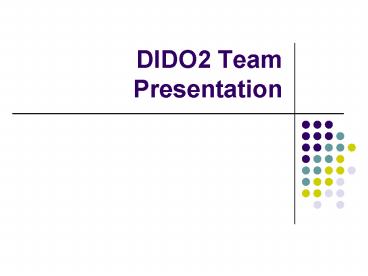DIDO2 Team Presentation - PowerPoint PPT Presentation
1 / 21
Title:
DIDO2 Team Presentation
Description:
Yahoo e-mail archive and group calendar. Group web portal. Performing ... Yahoo Group Calendar. Shared server space on Ella. Majordomo email list. Syllabus ... – PowerPoint PPT presentation
Number of Views:63
Avg rating:3.0/5.0
Title: DIDO2 Team Presentation
1
DIDO2 Team Presentation
2
DIDO2 Team Presentation
- Why Teams Do Work
- Michelle Dalmau, Matt Dever,
- Andrew Stevens and Charlene Wagner
3
Introductions
- Team Members Michelle, Matt, Andrew and Charlene
- Digital Images Delivered Online (DIDO), Version 2
(DIDO2) - Create an Image Repository
- Enhance browsing and searching
- Provide ability to generate presentations for
class lectures / study guides
4
DIDO2 Team Cultural Model
5
Forming
- Quick formation! As you can see by our first
meetings agenda - Learned about each other current areas of
expertise, interests, weaknesses - Explained context (DLP/Slide Library, see
cultural model) - Reviewed problem definition and general interests
in the proposed project - Reviewed existing DIDO 2 documentation (survey
results) - Starter tasks assigned
6
Teams Current State
- Experiencing disconnect between class
requirements and actual project evolution - From engaging, deliberate work (thru contextual
inquiries) to fragmented, rushed work - Prototyping -- huge leap with only 4 contextual
inquiries documented. Hi-Fi, grayscale screen
designs, work in progress. - Usability Testing -- due too soon! Difficult to
recruit faculty this time of year. Considering
alternatives to Walkthrough such as guided
Heuristic Evaluation. - Working to maintain overall purpose, which
exceeds classroom expectations, in sight
7
The DIDO2 Team Perseveres
8
Why teams work
- Inclusive decision making
- Willingness to contribute and discuss ideas
freely - Team members respect and value each other
- Team developed strong interpersonal bonds
- Commitment to team goals over personal goals
9
Work Process
- Held regular meetings
- Primarily used for planning, exchanging
information, and dividing labor. - Multiple electronic means of communication
- E-mail discussion list
- Shared server space
- Yahoo e-mail archive and group calendar
- Group web portal
10
Performing
- TBA
11
Team Physical Model
12
DIDO2 Team Presentation
- Why Teams Do Work
- Michelle Dalmau, Matt Dever,
- Andrew Stevens and Charlene Wagner
13
Team Work Flow
Fine Arts Faculty -Primary user group -many
variations in teaching styles some rely on DIDO
and like resources for lectures, others DONT
Survey
Professor Hara -Identify timelines and
project guidelines -Provide information
and feedback
Fine Arts Slide Library -Gatekeeper of DIDO
-responsible for adding images and
metadata -help recruit users
Limited time and faculty participation
Digital Library Program -Technical support for
DIDO -host collection and images, -provide
best practices for digitization
Michelle -Liason between project team and other
stakeholders -Contribute specialized skills
Meeting agendas and moments -Method for
monitoring progress
Matt -Contribute outside perspective and
specializedskills
DIDO2 Portal Page -Enables easy access to
shared work
Charlene -Contribute outside perspective and
specialized skills
provide continuous input and feedback
Yahoo Calendars -Help with scheduling
Difficult to maintain
Andrew -Contribute outside perspective and
specialized skills
Difficult to maintain
Asynchronous communciation
Group Space on Ella -Enables document sharing
DIDO2 Team
Majordomo email list -allowed for
continuous communication
-Create work models -Participate in user
interviews -Identify and prototype design
ideas -Collaborate in all aspects of team
project -Identify and monitor project timelines
14
Team Artifacts/Tools
- Team portal page
- Yahoo Group Calendar
- Shared server space on Ella
- Majordomo email list
- Syllabus
- Contextual Design Book
15
Group stages
- Forming, storming, norming, performing Moving
teams through stages of success - Forming
- -identifying similarities, expectations, and
purpose - Storming
- -identifying roles and responsibilities
- Norming
- -forming of strong group relationship
- Performing
- -time of personal growth and group
accomplishment
16
Group Norming
- The group as a whole gains in focus and
unanimity. - Constant state of norming
- Re-normed as needed to adapt to new tasks at
hand - Continuous and fluid sharing of information and
ideas
17
Group Decision Making
- All the pluses of Consensus and none of the
minuses - All the pluses of Expert and none of the minus
- All the pluses of Authority Rule With
Discussion and none of the minuses
18
Deferential Democracy
- Metaphor for our team process
- Our expert was connected, and was afforded
respect - Our expert respected us in return, and no ideas
were ignored - We used an amalgamation of the models described
earlier, which left us in a perpetual state of
productiveness (versus corruptiveness)
19
Storming
- We worked through many of the stages of
storming without a storm - What are we supposed to accomplish?
- What are our roles and responsibilities?
- Where do we each get our information?
- Who's in charge?
- How will we make decisions?
- What happens when we fight?
20
Storming
- How will we make decisions?
- What happens when we fight?
- Individual strengths and weaknesses?
- Meeting times?
- Accessability of members (to each other)?
21
Team Sequence Model































